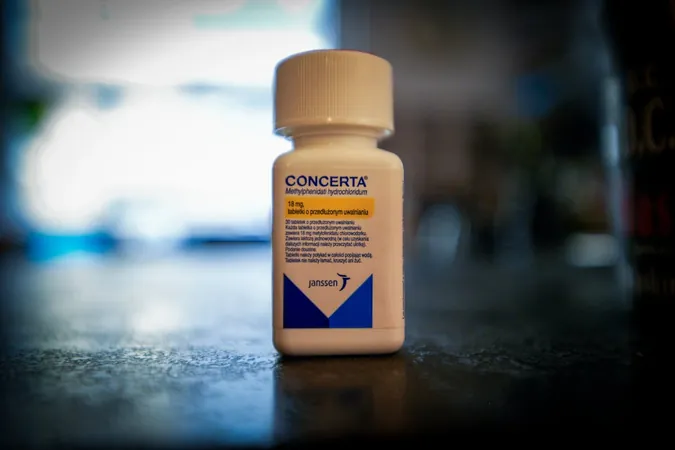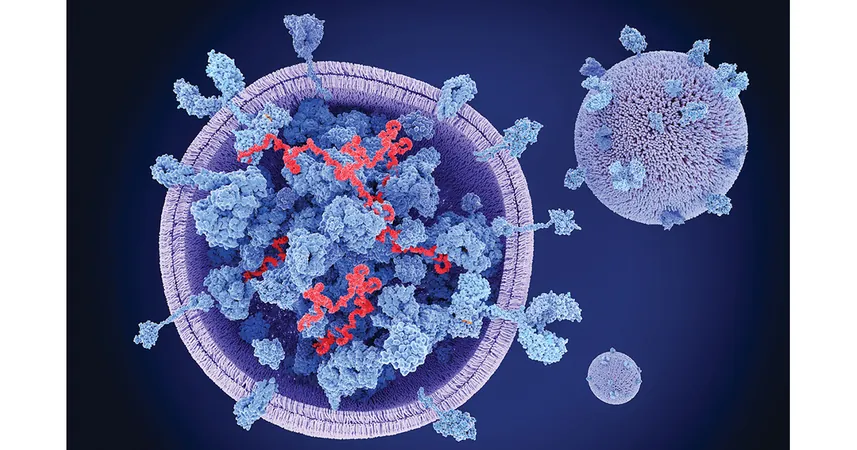
Attention Deficit Hyperactivity Disorder in Adults: New Study Exposes Research Gaps and Treatment Challenges
2024-12-18
Author: Emma
Introduction
A recent analysis published in The Lancet Psychiatry reveals a striking lack of research concerning the treatment of adults with Attention Deficit Hyperactivity Disorder (ADHD), a common neurodevelopmental disorder that affects approximately 5% of children globally. While it’s widely recognized that about half of these children continue to grapple with ADHD symptoms into adulthood, the insufficient focus on adult interventions leaves many without effective treatment options as they transition into later stages of life.
Manifestation and Treatment of ADHD
ADHD manifests through symptoms like distractibility and impulsiveness, which can severely impact daily functioning. Stimulant medications such as amphetamines and methylphenidate have become mainstays in treatment, yet many adults are forced to rely on off-label prescriptions due to a dearth of clinical trials dedicated to this demographic. For instance, methylphenidate—an effective treatment for children and adolescents—lacks official approval for adult use. As Narcís Cardoner, head of psychiatry at Hospital de Sant Pau in Barcelona, points out, “It’s absurd that a high school student transitioning to university cannot continue on the same medication despite the evidence of its efficacy in younger populations.”
Study Overview
The comprehensive study, spearheaded by Edoardo G. Ostinelli from the University of Oxford’s Precision Psychiatry Laboratory, meticulously analyzed 113 studies involving 14,800 participants to better understand ADHD treatment options for adults. Its key findings indicate that both stimulant medications and atomoxetine—a non-stimulant drug that enhances focus and diminishes impulsivity—are currently the most effective options for alleviating ADHD symptoms in adults, as evaluated by both healthcare professionals and patients.
Effectiveness and Side Effects
However, while stimulants show promise, atomoxetine often comes with substantial side effects such as increased blood pressure and insomnia, prompting many patients to discontinue its use. Additionally, the effectiveness of non-pharmacological treatments, including cognitive behavioral therapy, mindfulness practices, and transcranial direct current stimulation, yielded disappointing results. Although some of these approaches may have shown minimal improvements according to healthcare providers, patients reported no significant enhancements in their symptoms.
Urgent Need for Further Research
With these findings in mind, the authors underscore the urgent need for further research to establish more robust evidence regarding ADHD treatments for adults. Despite the encouraging data demonstrating short-term benefits of stimulant use, significant questions remain regarding long-term effects and overall quality of life improvements.
Expert Opinions
Experts such as David Coghill from the University of Melbourne have acknowledged the complexity of ADHD treatment, advocating for the development of evidence-based guidelines while also highlighting the challenges of drawing comparisons between pharmacological and non-pharmacological therapies. In a critical commentary, Coghill points to the necessity for more detailed studies that can isolate treatment components for comparison.
Associated Psychiatric Disorders
Ashley Bush, a researcher at Coghill University specializing in Psychiatry and Neuroscience, emphasized that ADHD often occurs alongside other psychiatric disorders, complicating treatment outcomes. “While non-pharmacological interventions may not address core ADHD symptoms directly, they can play an essential role in treating associated issues like anxiety and depression,” Bush noted.
Call for Research Expansion
The overarching message from this study points towards an urgent call for research expansion. As Cardoner puts it, while there's limited evidence on the efficacy of psychotherapeutic approaches and neurostimulation in adults, this should not undermine their potential value. “Although designing rigorous trials in this field is challenging, it is crucial to continue exploring these avenues,” he stated.
Conclusion
Andrea Cipriani, co-author of the study, echoes this sentiment, insisting upon the need for comprehensive investigations into the long-term effectiveness of all treatment modalities available for adults suffering from ADHD. Clinicians currently lean heavily on anecdotal evidence and personal observations rather than robust scientific data when prescribing stimulant medications, suggesting a significant gap that needs to be bridged to ensure effective, evidence-based care for adults facing this complex disorder.
This study serves as a crucial reminder of the pressing need to reevaluate and revitalize the approach to ADHD in adults—an area that, until now, has been overshadowed by the focus on pediatric care. As awareness grows, it is hoped that more research funding will contribute to developing innovative strategies that prioritize the well-being of adults navigating this challenging disorder.









 Brasil (PT)
Brasil (PT)
 Canada (EN)
Canada (EN)
 Chile (ES)
Chile (ES)
 España (ES)
España (ES)
 France (FR)
France (FR)
 Hong Kong (EN)
Hong Kong (EN)
 Italia (IT)
Italia (IT)
 日本 (JA)
日本 (JA)
 Magyarország (HU)
Magyarország (HU)
 Norge (NO)
Norge (NO)
 Polska (PL)
Polska (PL)
 Schweiz (DE)
Schweiz (DE)
 Singapore (EN)
Singapore (EN)
 Sverige (SV)
Sverige (SV)
 Suomi (FI)
Suomi (FI)
 Türkiye (TR)
Türkiye (TR)